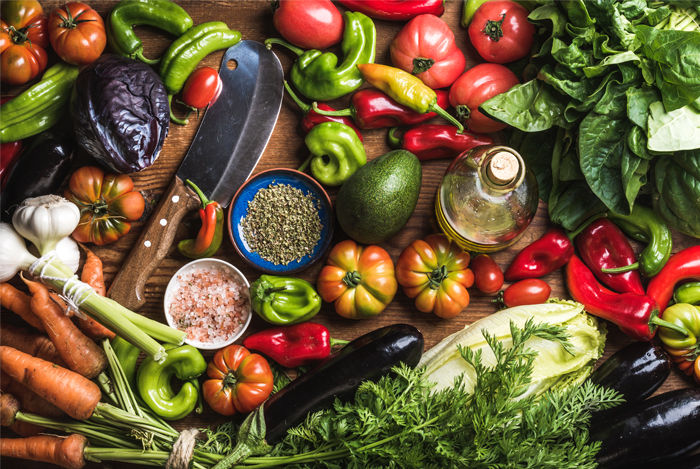Vegetarians choose their diet for various reasons. Check out whether the plant-based diet is right for you and unveil the secrets of balanced nutrition.
Vegetarian Diet Contributes to Your Health and Mind
Vegetarian diets become more and more popular. People are becoming interested in plant-based diets mostly for ethical reasons, to improve their health or to control their weight. Many vegetarians choose this way because they are concerned about animal-cruelty problems and the damage the meat and milk industries cause to the environment. Alongside the ethical side of the vegetarian diet, it is found to be highly beneficial for people’s health. At times, people are unable to get complete nutrition, thus taking supplements seems to be the best options. At times, many people are unable to get complete nutrition in their diet, thus taking supplements seems to be the best option – vox nutrition is one such company that offers a range of sports, skincare, and dietary supplements for this purpose.

A vegetarian diet reduces the risk of cancer, heart diseases, helps to keep low blood sugars, decreasing the risk of diabetes type 2. If you need an essay about the way to keep a healthy vegetarian diet you may order essays online here. Comparing the full vegetarian and non-vegetarian diets there may be defined such benefits as:
- The lower amount of saturated fats and cholesterol
- The higher amount of fiber intake
- More vegetables, fruits, nuts, legumes, whole-grain food in the diet
- More vitamins C and E, potassium, magnesium, folic acid, antioxidants and phytochemical compounds
- Lower glycemic load
Of course, the main key to a healthy diet is being conscious about your nutrition. It is absolutely possible to provide the rich and complete nutrition based on plant food.
Differences Between Types of Vegetarian Diet:
There are various types of plant-based diets, some of them include food of animal origin and some of them are completely based on plant food. Here are the main types of a vegetarian diet:
- Vegans do not eat meat, poultry, fish, dairy products, eggs, honey and avoid all the products of animal origin, like leather and fur, in their everyday life
- Lacto-vegetarian. This type of diet excludes meat, fish, and poultry but allow milk and dairy products
- Lacto-ovo-vegetarian. People who keep this kind of diet include dairy and eggs but do not eat meat, poultry, and fish
- This diet excludes all the food of animal origin but allows fish
- No animal origin food except poultry
- Semi-vegetarian diet. A plant-based diet which allows some amount of animal origin products in the occasion
Vegetarian Diet: How to Start?
If you want to try keeping a plant-based diet, first of all, you should properly plan your diet to be sure you get all the needed nutrition. Decide what products you want to keep in your diet, whether there will be any meat, fish, dairy products. Remember that the stricter your diet is, the harder it is to get all the needed nutrition. Include a variety of plant food because eating only one source of food is risky for your health. Try to add some food supplies if needed and watch how your body feels.
Tips for Conscious Beginner Vegetarians
- Start planning your new diet enhancing it with slow-carb products. The whole-grain food contains a lot of plant protein. This helps you to get the needed calories and avoid the lack of protein
- Try out new grains, legumes, soy products you haven’t tried before. The variety of foods is the key to a successful diet. Make an emphasis on new dishes but leave the meals you got used to, changing some of their components
- Talk to your doctor about the supplements that may be included in your diet according to your habits
- Soy milk with added calcium fulfills the need for calcium in a way the milk does, but it contains less fat and no cholesterol
- A lot of the meals that contain meat may be cooked as vegetarian just by changing some of the ingredients. This will help you to reduce the number of saturated fats and cholesterol in your diet. Get some vegetarian cookbooks and do not be afraid to try new recipes
- Check out vegetarian-friendly restaurants and don’t be shy to ask to change some ingredients in your meal while dining out
Nutrients You Should Pay Attention If You Keep the Vegetarian Diet
The more variety of food you include in your diet the less is a risk of lack of nutrients. Eating whole-grain food, fruits, legumes, oils, nuts, and greens will enhance your health, providing the proper nutrition and energy. Here are some Harvard Health Publishing recommendations on reducing the risk of nutrients deficiency.
- Vitamin B-12. This vitamin may be found mostly in meat and animal products, it cannot be provided by plant food. The deficiency of B-12 may cause anemia and other health problems. It is important not to miss this component in your nutrition and add some vitamin supplements to your diet if needed
- Protein. If you are keeping a vegan diet, soy products, whole grain foods, nuts, and seeds may provide you the needed amount of protein to keep your muscles and bones healthy. Dairy and eggs also contain enough protein, so if your diet is not based on plants you may rely on these products
- Iodine. Iodized salt in small amounts and seaweed may reduce the risk of iodine deficiency
- Calcium. Dark-green vegetables, tofu, and calcium-enriched soy milk help vegetarians to manage with the needed amount of calcium consumption
- Omega-3 fatty acids. Non-vegetarians get these important for heart components from fish and eggs. Oils, seeds, and nuts are rich in Omega-3 fatty acids and may help to reduce the deficiency of these nutrients
- Whole-grain products, chicken peas, spinach and dried fruits are good sources of iron for a vegetarian. It is important to eat vitamin C containing food alongside with iron-containing products to help the iron absorb. Iron is extremely important for red blood cells. Iron absorbs worse from plant food than from animal products so it is important to be sure you get the needed amount of it with your nutrition
Many researches proved the health benefits of the meat-free diet. Being conscious about what you eat is the great step to a better living. Planning your diet properly, enriching it with vegetables, fruits, nuts, and seeds will positively affect your body and mind.













